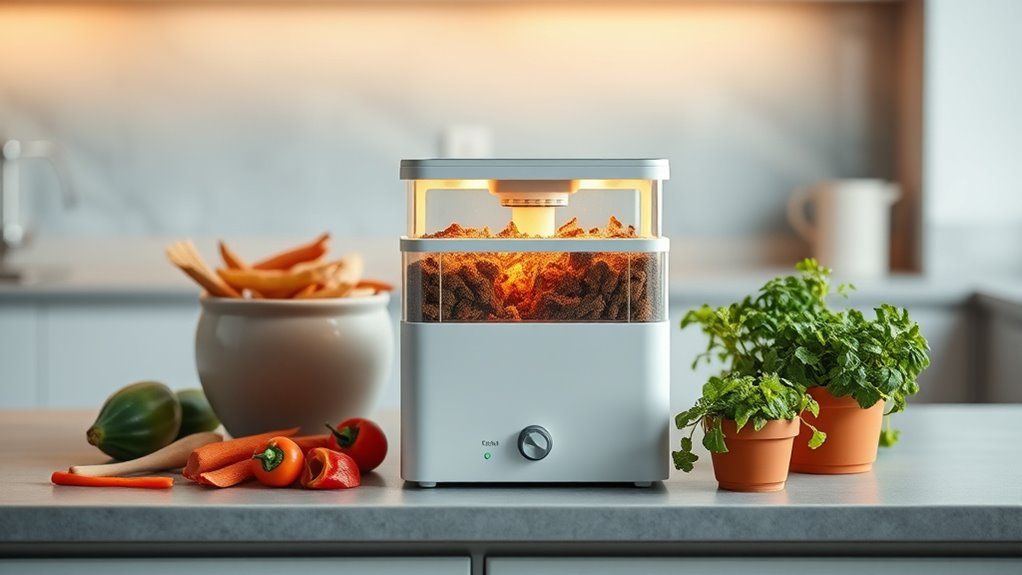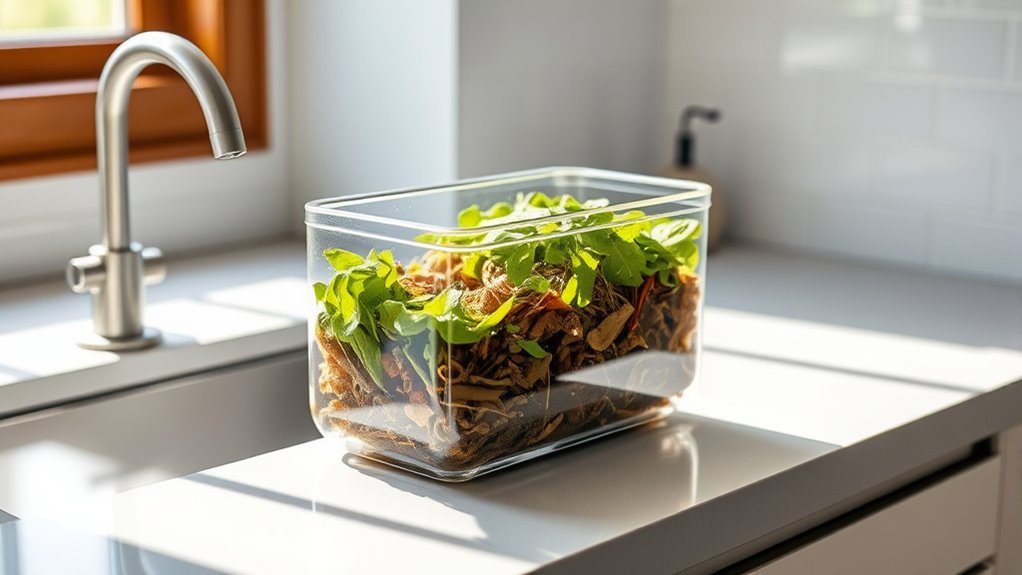Counter-top bioreactors make kitchen composting easy by turning food scraps into rich compost right inside your home. They use worms and controlled airflow to break down waste efficiently, reducing odors and mess. Proper moisture and temperature management are key to quick, healthy compost production. These systems are perfect for small spaces and busy lifestyles, helping you waste less and grow healthier plants. Keep exploring to discover how mastering the science can make your composting even more successful.
Key Takeaways
- Counter‑top bioreactors simplify composting by controlling moisture, airflow, and temperature for optimal worm activity.
- Proper science-based balance of moisture and aeration prevents odors and promotes rapid waste breakdown.
- They enable indoor composting, reducing landfill waste and greenhouse gases in small spaces.
- Built-in features like aeration and moisture controls make maintenance easy and efficient.
- Understanding composting science ensures healthy worms and high-quality compost production.

Have you ever wondered how you can turn kitchen scraps into something beneficial? With the rise of kitchen composting, more people are discovering how simple it is to transform everyday waste into valuable compost right on their countertops. One innovative method gaining popularity is using counter-top bioreactors, which make composting accessible and mess-free. These devices leverage the science behind vermicomposting benefits, where worms break down organic waste efficiently, producing rich, nutrient-dense soil. Unlike traditional composting, which can be slow and sometimes smell if not managed properly, these small-scale systems are designed to minimize odors and require less space. They’re perfect for apartment dwellers or anyone with limited outdoor access who still wants to reduce waste and support sustainable living.
Transform kitchen scraps into nutrient-rich compost effortlessly with countertop bioreactors—perfect for small spaces and eco-conscious living.
However, it’s important to acknowledge some composting challenges. For instance, managing moisture levels, temperature, and airflow within a small container can be tricky. Too much moisture can lead to anaerobic conditions, resulting in foul odors, while too little can hinder the worms’ activity. This is where understanding the science of composting comes into play. Proper balance ensures your worms stay happy and active, turning scraps into compost quickly. The benefits of vermicomposting are significant—it produces high-quality compost faster than traditional methods and requires minimal effort once set up. Plus, it reduces the volume of waste sent to landfills, lowering greenhouse gas emissions and contributing to a healthier environment.
Using a counter-top bioreactor simplifies many of these challenges. These systems often come with built-in aeration and moisture controls, making it easier to maintain ideal conditions without constant monitoring. You simply add your kitchen scraps—vegetable peels, coffee grounds, eggshells—and let the worms do their work. Over a few weeks, you’ll see your waste diminish, replaced by dark, crumbly compost ready to nourish your houseplants or garden. This process not only saves space but also turns what would be trash into a valuable resource, closing the loop on waste management right in your kitchen.
In addition, these systems are designed to be user-friendly, so you’re less likely to encounter common composting challenges. They often come with guides and tips to help you get started and troubleshoot issues as they arise. You’ll feel good knowing you’re reducing your environmental footprint and creating something beneficial from scraps that might otherwise end up in the trash. Embracing countertop vermicomposting makes eco-friendly habits easy, convenient, and rewarding, allowing you to participate actively in sustainable practices without the need for a backyard or compost bin. Proper balance of moisture and airflow is essential for maintaining optimal conditions and ensuring your worms remain healthy and productive.
Frequently Asked Questions
How Long Does Composting Take in a Counter-Top Bioreactor?
The composting duration in a counter-top bioreactor varies, but generally, you can expect the composting timeline to be around 2 to 4 weeks. Factors like the type of waste, bioreactor settings, and temperature influence this timeline. You’ll notice the bioreactor accelerates decomposition, so your compost is ready faster than traditional methods. Regular maintenance and proper balance of materials help guarantee a quicker bioreactor timeline.
What Types of Food Scraps Are Best for Composting?
Think of your compost as a lively garden party. You’ll want to invite friendly guests like fruit peels and coffee grounds, which break down quickly and enrich the soil. Avoid heavy or oily scraps, as they can slow the party down. Your counter-top bioreactor thrives on these easy-to-digest scraps, turning waste into rich compost. Keep the mix balanced, and you’ll enjoy a vibrant, productive compost in no time!
How Do I Prevent Odors From My Bioreactor?
To prevent odors from your bioreactor, guarantee proper air circulation by regularly opening vents or using a fan if needed. Cover food scraps with carbon-rich materials like sawdust or shredded paper to absorb odors. Keep the lid tightly sealed when not tending to it, and consider adding odor absorbents such as activated charcoal. These steps help minimize smells and keep your composting process clean and fresh.
Is Electrical Power Required for These Bioreactors?
You might wonder if these bioreactors need electricity dependency or specific power source requirements. Generally, many models operate without electrical power, relying on natural processes like aeration and microbial activity. However, some advanced versions do require a power source to automate mixing or temperature control. Always check your bioreactor’s specifications, but remember, not all need electricity—many are designed to work off the grid, making composting simple and eco-friendly.
How Often Should I Clean or Maintain the Device?
You should follow a regular cleaning schedule to keep your bioreactor functioning well. Typically, cleaning once a month is sufficient, but check the manufacturer’s guidelines for specific maintenance frequency. Regular maintenance helps prevent odors and buildup, ensuring your device operates efficiently. Be sure to empty and clean the container and filters as recommended, and inspect the system for any issues. Proper upkeep makes composting easier and more effective.
Conclusion
By embracing countertop bioreactors, you turn kitchen waste into valuable compost effortlessly. Imagine Susan, who started composting her vegetable scraps; within weeks, she had rich soil for her garden. You can do the same—reducing waste and nurturing your plants with ease. With just a simple bioreactor on your counter, composting becomes a seamless part of your daily routine, making your kitchen more eco-friendly and your garden healthier.










